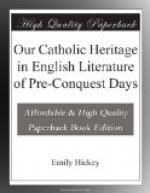Alfred was always a loyal son of the Church. His father, AEthelwulf, sent him to Rome when he was quite a little boy, and Pope Leo IV was godfather to him at his Confirmation, and, on hearing the report of AEthelwulf’s death, consecrated him as king, as he had been asked to do. But AEthelwulf did not die for a little time after, and took Alfred for a second visit to Rome. Each of Alfred’s three brothers reigned a short time before he became King of Wessex in 871. In that same year he fought no fewer than nine battles against the Danes, besides making sundry raids upon them. It is well to be a good fighting man where need is, and it is well to use the qualities that go to the making up of the good fighting man to meet the difficulties that beset the path of duty and the way of progress. Courage, strength, generosity, perseverance, these are needed for all work alike in peace and war.
Alfred was familiar in his youth with English songs, and most probably knew the old Norse sagas; but he had to learn Latin in his later life. We must remember that most of the literature which Alfred could get at was locked up in Latin; even the invaluable Church History of St Bede needed a translator’s key; and it was Alfred who first applied this key to it.
When we think of the prose written in England in early days, we are thinking of the work of scholars, in a grand language that had done growing; a language that was to be in Western Christendom the language of religion, the language of the altar, for how long a time who can know? the language that gave birth to other languages, as its literature so powerfully influenced both theirs and that of others not descended from it. Not yet was the time for a great prose literature in England, such as grew up many a year ago, and is going on in our own days.
The earliest literature of a people is almost invariably in verse: the literature that comes from the heart of a people, and is not the production of a few learned folk. In early days, there was little reading or writing, except in the shelter of the great monasteries. The common folk-literature, which is a very precious thing, is preserved, in such times as we are thinking of, in people’s memories, and circulated by recitation, this recitation being accompanied by music or by rhythmical movements of the body. We all know how much easier it is to remember a page of verse than a page of prose. Thus, the form that could most easily be carried in the memory and recited, would naturally be the first to flourish.
We have seen something of early English religious poetry in Caedmon’s work and that of his followers; and next we shall come back to poetry with Cynewulf, who made great and holy verse.
But beside such work as these poems which were written by cultivated men, many poems and fragments of verse were floating about the land, come over from the old native country with the first Angles and Saxons who made their home in Britain. These were dear to the people and dear, as we shall see, to the greatest among their kings, Alfred, who was, we may say, the founder of English prose. It was not English prose as we know English prose, because the language was then more like German than anything else; but it was prose in the native tongue, and this was a good and great thing to begin.




